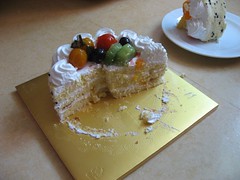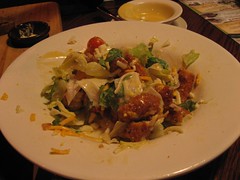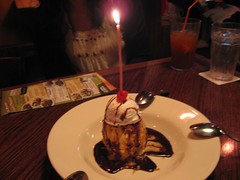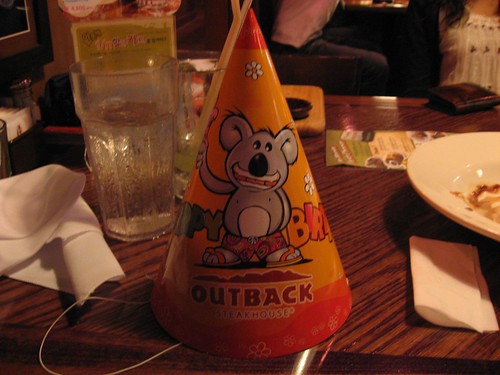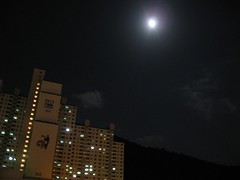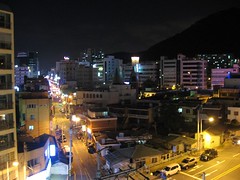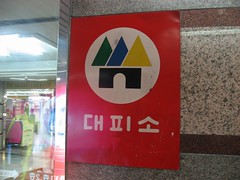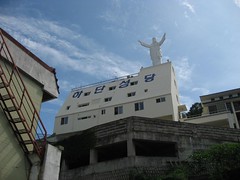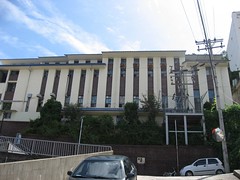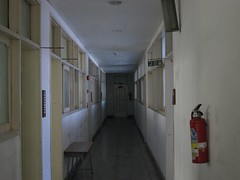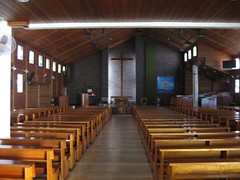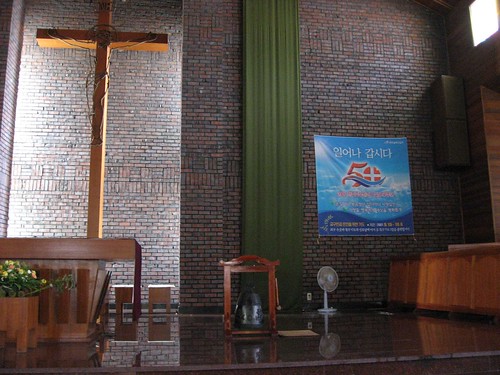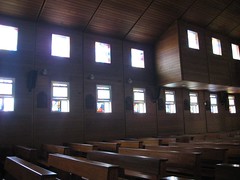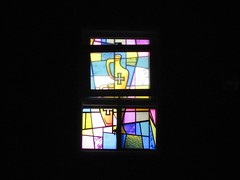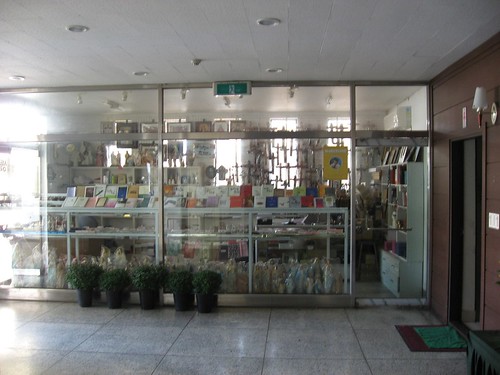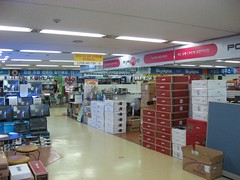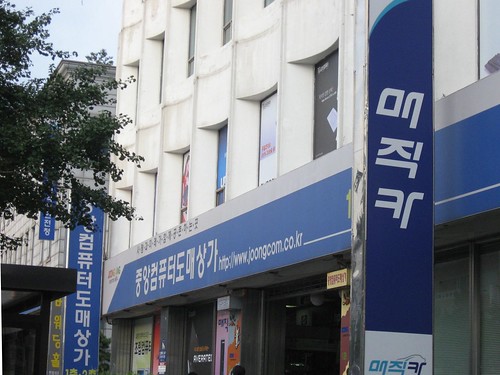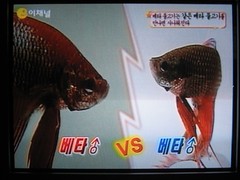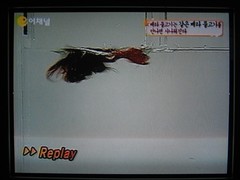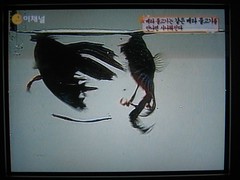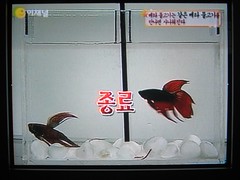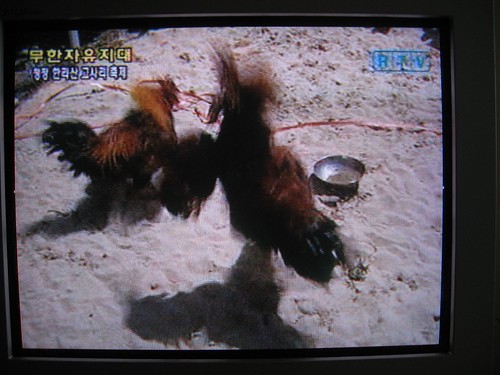It was my birthday on Friday but due to a misunderstanding Korean Mother brought round cake Wednesday evening, believing it to be the next day. While a few birthday cakes are sold back home, I'm under the impression that they are a much more serious affair in Korea - where almost every bakery seems to sell a wide variety due to constant demand. That said, the cake brought to us was a typical example - featuring lots of fresh cream and an improbable amount of fruit loaded onto the top - complete with plastic cutting knife, matches and candles bearing the message 'Happy Birthyday' (you read that right). While all cakes are freshly made, Korean Mother asked if the store would bake one there and then because it was her son-in-law's first birthday in Korea. Surprisingly they complied (although it only took about six minutes) and even more surprisingly they gave her a discount as well. Fearing the cream would go off, we had to start eating the cake on Thursday.
On Friday we went out to the popular Korean, Australian-themed but American owned 'Outback Steakhouse' where, due to my need to maintain a low-sodium diet, I regularly chance my luck with their over-salted menu. Still, you can't go far wrong with a chicken salad, although the accompanying jacket potato was a different matter. Evidently one of our party informed the waitress that it was my birthday, so when dessert arrived it was complete with a candle and she was armed with a hat and camera to take a commemorative photo.
Fortunately I somehow managed to avoid the usual ordeal of having three teenage waitresses come over and sing to me for the occasion, or maybe that's something that another chain, VIPs, tends to do. I know that Outback, VIPs and Bennigans all have their unique points, but whereas back home they would have seemed different, I guess I've been in Korea long enough to just see them as somewhat blandly-interchangeable Western-style diners.
We finished off the rest of the cake in the evening and whether it was that, the marshmallow ice cream dessert, the salad or the sour cream soaked potato, I spent a significant part of Saturday morning being sick in the bathroom, and there hadn't even been any soju involved.
Korean tags: 생일, 케이크, 음식, 레스토랑
Sunday, September 30, 2007
Wednesday, September 26, 2007
Thanksgiving
We don't have a Thanksgiving holiday back in the UK, but a Hollywood has embedded the image in my psyche of an annual trip home to endure an awkward turkey dinner in a highly charged atmosphere. While there's no turkey in Korea, where the harvest festival holiday is called Chuseok (추석), most of the rest probably holds true, although it tends to be more of a thanksgiving breakfast after a paying respects to your ancestors, than a dinner here.
The mini-marts and takeaways which keep us fed on a daily basis were expected to be closed, so we stocked up on food Monday, as we weren't participating in meals ourselves - aside from it being a normal working day for us Korean Father was already at his father's house in Namhae and Korean Mother travelled down earlier to join the extended family's celebration there. It's a duty, and not an easy one to fulfil given the fact that many other Koreans are also trying to move themselves around the country at the same time.
One consequence of this near Biblical movement of people was that in the evening it took Korean Mother six hours to get back to Busan on a bus that would normally take three. Another consequence may have been the deserted streets nearby - it seemed that everyone was somewhere else. This was a good thing, because for the first time I can recall since arriving here, it was actually quiet when I woke up. Well, quiet outside at least, as evidently somewhere in our apartment block a presumably holidayed office worker thought 7.30am a perfectly acceptable time to practice chords on his guitar. This still beat listening to car horns, sales pitches and people shouting at each other though, which is what passes for the local dawn chorus here otherwise. It was vaguely reminiscent of some kind of sci-fi disaster movie - the sort where everyone either vanishes or turns into flesh-eating government bureaucrats.
Walking through the local streets in the suspiciously-unusual fresh air, revealed shops uniformly shuttered up and a complete lack of economic activity save for the mini-mart we live above. Some houses and apartments had placed dishes with food outside their doors after their thanksgiving breakfasts to feed any visiting ghosts, but I wasn't hungry, and that's about as close as I got to anything traditional during the day.
The wonderful peace and quiet was shattered once mid-afternoon when inexplicably an ambulance decided park across the end of one of the nearby deserted roads, sounding its siren for five minutes, which given the total lack of other noise was especially noticeable. An ajeossi appeared to shout at him from across the road and when that didn't work, he walked up to the driver's door and shouted some more at about the same volume, and that saw the vehicle off. Which I guess proves that the real Korea isn't far beneath the surface and we'll be all back to our usual agitated selves tomorrow.
It is a traditional part of Thanksgiving here to pray to the moon once night falls. So shortly after the London stock market closed at half-past midnight, we ventured up to the roof of our apartment building to see if it was visible. And there it was. I'm not much one for praying to astronomical objects so while my wife did her Korean duties I took some shots of the local streets, which even for 1am in the morning were particularly deserted. Today, it was back to the noise I suppose.
Korean tags: 추석, 휴가
The mini-marts and takeaways which keep us fed on a daily basis were expected to be closed, so we stocked up on food Monday, as we weren't participating in meals ourselves - aside from it being a normal working day for us Korean Father was already at his father's house in Namhae and Korean Mother travelled down earlier to join the extended family's celebration there. It's a duty, and not an easy one to fulfil given the fact that many other Koreans are also trying to move themselves around the country at the same time.
One consequence of this near Biblical movement of people was that in the evening it took Korean Mother six hours to get back to Busan on a bus that would normally take three. Another consequence may have been the deserted streets nearby - it seemed that everyone was somewhere else. This was a good thing, because for the first time I can recall since arriving here, it was actually quiet when I woke up. Well, quiet outside at least, as evidently somewhere in our apartment block a presumably holidayed office worker thought 7.30am a perfectly acceptable time to practice chords on his guitar. This still beat listening to car horns, sales pitches and people shouting at each other though, which is what passes for the local dawn chorus here otherwise. It was vaguely reminiscent of some kind of sci-fi disaster movie - the sort where everyone either vanishes or turns into flesh-eating government bureaucrats.
Walking through the local streets in the suspiciously-unusual fresh air, revealed shops uniformly shuttered up and a complete lack of economic activity save for the mini-mart we live above. Some houses and apartments had placed dishes with food outside their doors after their thanksgiving breakfasts to feed any visiting ghosts, but I wasn't hungry, and that's about as close as I got to anything traditional during the day.
The wonderful peace and quiet was shattered once mid-afternoon when inexplicably an ambulance decided park across the end of one of the nearby deserted roads, sounding its siren for five minutes, which given the total lack of other noise was especially noticeable. An ajeossi appeared to shout at him from across the road and when that didn't work, he walked up to the driver's door and shouted some more at about the same volume, and that saw the vehicle off. Which I guess proves that the real Korea isn't far beneath the surface and we'll be all back to our usual agitated selves tomorrow.
It is a traditional part of Thanksgiving here to pray to the moon once night falls. So shortly after the London stock market closed at half-past midnight, we ventured up to the roof of our apartment building to see if it was visible. And there it was. I'm not much one for praying to astronomical objects so while my wife did her Korean duties I took some shots of the local streets, which even for 1am in the morning were particularly deserted. Today, it was back to the noise I suppose.
Korean tags: 추석, 휴가
Monday, September 24, 2007
Dr. Strangelove
On the subject of wars, technically South Korea is still in a state of one with its northern neighbour. In that sense, living here is a surreal mix of consumer-driven normality punctuated by civil defence drills, national service and occasional shooting at one-another across the border. As much as this mix of peace and war is normal in the South, the normality of the axis of evil wannabe North is the bizarre. So while peace talks go on endlessly, which is clearly mostly the point for the North Koreans, we all live with the vague but bizarrely possible threat that one day the leadership there will be pushed by their own collective paranoia into doing something that we'll all not live to regret.
Aside from all the other implications of this is the somewhat interesting precedent that the British Government have exiled me to a country which is still technically at war on the grounds that I am 'free to enjoy my life here'. Human rights lawyers take note.
When I first arrived in Korea there was a lot to take in, and the truth is that even a year later I'm still noticing things for the first time which I've probably walked by hundreds of times without a second glance. So once I subconsciously realised that these signs can't possibly indicate tunnels which run under mountains, or be warning against camping in subways, I finally discovered that '대피소' means 'shelter'.
In an ironic reminder of a tensions past, in the background of the shelter notice is a yellow sign in Russian. Without wishing to give away any military secrets this is actually the vast underground shopping arcade in the Nampodong area linking two subway stations, and it doesn't look as though it affords much protection from anything, though you'd never go short of a change of clothes at least. On the other hand, it's better than the shelter in the station near us, where the instant coffee machine isn't going to keep anyone going for long.
Korean tags: 전쟁, 대피소, 정부
Aside from all the other implications of this is the somewhat interesting precedent that the British Government have exiled me to a country which is still technically at war on the grounds that I am 'free to enjoy my life here'. Human rights lawyers take note.
When I first arrived in Korea there was a lot to take in, and the truth is that even a year later I'm still noticing things for the first time which I've probably walked by hundreds of times without a second glance. So once I subconsciously realised that these signs can't possibly indicate tunnels which run under mountains, or be warning against camping in subways, I finally discovered that '대피소' means 'shelter'.
In an ironic reminder of a tensions past, in the background of the shelter notice is a yellow sign in Russian. Without wishing to give away any military secrets this is actually the vast underground shopping arcade in the Nampodong area linking two subway stations, and it doesn't look as though it affords much protection from anything, though you'd never go short of a change of clothes at least. On the other hand, it's better than the shelter in the station near us, where the instant coffee machine isn't going to keep anyone going for long.
Korean tags: 전쟁, 대피소, 정부
Sunday, September 23, 2007
Money Never Sleeps
They say that money never sleeps, and increasingly neither do I, and not just because of the return of the humid weather that seems to conspire to turn our one-room apartment into an extended oven. When global stock markets become extremely volatile, to the point it even brings down a high street bank back home, there's money to be made and lost, Bloomberg gets streamed ten hours a day and Korea might as well be in another country, especially when you've taken to trading the Hong Kong market in the morning to try and wean yourself off trading London past midnight and somehow only succeeded in finding yourself embroiled in both.
It's a mistake of course. I'd been making some progress with my Korean language studies, by the time I stepped outside yesterday, for the first time since Monday, it felt a bit like I was having my first day in Korea all over again, for the lack of attention it's had in my mind recently. Because it was a market day, I was immediately hit with the smell of Korean cooking wafting through the streets mixed with the seemingly ever-present sewage smell, people shouting at each other in some strange foreign language, sometimes with megaphones, and using the road outside as a car park. The noise of a market day, which begins at about 8am and finishes around 10pm, is occasionally punctuated by quick blasts of police sirens as they try to work their own way through the crowds, often followed by sharply barked orders not to do this or that, which everyone naturally ignores.
It was all a bit of a shock really, not least because when leaving a shop I couldn't remember to say '수고하세요' which is the standard 'keep-up-the-good-work' thing that you say in these circumstances. My vocabulary has stalled at around 420 words but when I spend days immersed in the financial markets I'm lucky if I can remember my own name afterwards. When Keith Olbermann said George Bush's goal was 'War today! War tomorrow! War forever!' I couldn't help relating that phrase to my experiences here recently.
Korean tags: 공부, 시장, 전쟁
It's a mistake of course. I'd been making some progress with my Korean language studies, by the time I stepped outside yesterday, for the first time since Monday, it felt a bit like I was having my first day in Korea all over again, for the lack of attention it's had in my mind recently. Because it was a market day, I was immediately hit with the smell of Korean cooking wafting through the streets mixed with the seemingly ever-present sewage smell, people shouting at each other in some strange foreign language, sometimes with megaphones, and using the road outside as a car park. The noise of a market day, which begins at about 8am and finishes around 10pm, is occasionally punctuated by quick blasts of police sirens as they try to work their own way through the crowds, often followed by sharply barked orders not to do this or that, which everyone naturally ignores.
It was all a bit of a shock really, not least because when leaving a shop I couldn't remember to say '수고하세요' which is the standard 'keep-up-the-good-work' thing that you say in these circumstances. My vocabulary has stalled at around 420 words but when I spend days immersed in the financial markets I'm lucky if I can remember my own name afterwards. When Keith Olbermann said George Bush's goal was 'War today! War tomorrow! War forever!' I couldn't help relating that phrase to my experiences here recently.
Korean tags: 공부, 시장, 전쟁
Tuesday, September 18, 2007
In Memorium
There was a death in the family last week and today was the day of the funeral. Not being able to attend I'd resolved to visit a temple or a church on the same day as an act of remembrance. I've never been to a church here, but that seemed the most appropriate venue. I'm Catholic by birth, for my sins, and when I was told there was a Catholic church nearby this was clearly more preferable than a competitor church where they'd probably be lying in wait to convert me the moment I walked through the door.
It turns out I'd spotted the Catholic church before - it's a local building with a large statue of Jesus on it's roof, why am I not entirely surprised? But is this more frightening at night than the neon crucifixes that rival denominations favour? That's the key question.
Entering into the building took us down a corridor of classrooms, which was not quite what I expected, perhaps they still have Sunday School in Korea. Shudder. We had to ask at the office where the actual church proper was - upstairs was the answer. Back home churches are always single ground-floor affairs.
Aside from this, it could have been any modern Catholic church back home, although the bell near the altar was styled like those in Korean temples, which is either a nice touch or a cynical move depending on your perspective. Many of the 'stained glass' windows were somewhat compromised by their evident need to be opened for air circulation - hardly surprising given the Korean summers. It was also possibly one of the quietest places I've found in Korea.
Some things are universal though - the church had a shop at the back where, should you be so inclined, you can stock up on your crucifixes and Mary statues.
Korean tags: 종교, 기독교, 교회
It turns out I'd spotted the Catholic church before - it's a local building with a large statue of Jesus on it's roof, why am I not entirely surprised? But is this more frightening at night than the neon crucifixes that rival denominations favour? That's the key question.
Entering into the building took us down a corridor of classrooms, which was not quite what I expected, perhaps they still have Sunday School in Korea. Shudder. We had to ask at the office where the actual church proper was - upstairs was the answer. Back home churches are always single ground-floor affairs.
Aside from this, it could have been any modern Catholic church back home, although the bell near the altar was styled like those in Korean temples, which is either a nice touch or a cynical move depending on your perspective. Many of the 'stained glass' windows were somewhat compromised by their evident need to be opened for air circulation - hardly surprising given the Korean summers. It was also possibly one of the quietest places I've found in Korea.
Some things are universal though - the church had a shop at the back where, should you be so inclined, you can stock up on your crucifixes and Mary statues.
Korean tags: 종교, 기독교, 교회
Friday, September 14, 2007
Electric Dreams
When I arrived in Korea one of the first priorities was to buy some computer equipment and get ourselves plugged back in to the global markets. But somewhat contrary to the high-tech image of itself Korea had projected, we couldn't find any computer stores locally. There were about two billion clothes shops (basically, a partnered man's worst nightmare), a thousand places to eat, a hundred PC Bangs and five hospitals within a mile of our apartment, but anyone selling computers? No. We eventually discovered an unadvertised floor of Etland selling low-end machines with seventeen inch monitors which weren't very inspiring, and ordered on-line from Hacker.
I put it down to not knowing where to look, but the more time went on the more I realised that as a percentage of retail outlets the number of computer stores seems to be as near a statistical zero as makes no difference. In fact, in six months I found two - both small shops - and one of them blurred-by so quickly while I was trapped in the back of a taxi that I doubt I could find it again.
Obviously demonstrating advanced symptoms of geek-withdrawal, a friend took us to a large computer store in Nampodong at the weekend, and this was more of what I had in mind. Machines and peripherals everywhere - so much so that they were evidently winning the ambient temperature battle with the air conditioning units. Like a lot of large Korean stores though, initial impressions can be deceptive; this wasn't one company, but rather a space evidently rented to lots of individual retailers competing for attention. As such, there was a lot of redundancy - people basically selling the same things, although on the plus side I imagine it must make the price competition quite keen. Usefully, a couple of units seemed to be doing repairs - fairly serious repairs judging by the amount of circuit boards and wires lying around.
But while there certainly was a lot of hardware, the software side of the equation was missing - no applications, no games, nothing. Maybe Koreans buy software on-line, maybe in stores I've yet to find, or maybe they don't tend to buy it at all; in a society where counterfeit bags and DVDs are sold openly on the streets of the main shopping areas it's not hard to imagine that software must suffer a similar fate.
Like a lot of leisure and retail places in Korea, this store is easy to miss from the street - there's nothing in the ground floor windows because it's actually on the floor above, and the sign reminds me of a bank's, so when I think that there just aren't these kind of places around it may just be the case that I'm not spotting them.
Korean tags: 가게, 컴퓨터
I put it down to not knowing where to look, but the more time went on the more I realised that as a percentage of retail outlets the number of computer stores seems to be as near a statistical zero as makes no difference. In fact, in six months I found two - both small shops - and one of them blurred-by so quickly while I was trapped in the back of a taxi that I doubt I could find it again.
Obviously demonstrating advanced symptoms of geek-withdrawal, a friend took us to a large computer store in Nampodong at the weekend, and this was more of what I had in mind. Machines and peripherals everywhere - so much so that they were evidently winning the ambient temperature battle with the air conditioning units. Like a lot of large Korean stores though, initial impressions can be deceptive; this wasn't one company, but rather a space evidently rented to lots of individual retailers competing for attention. As such, there was a lot of redundancy - people basically selling the same things, although on the plus side I imagine it must make the price competition quite keen. Usefully, a couple of units seemed to be doing repairs - fairly serious repairs judging by the amount of circuit boards and wires lying around.
But while there certainly was a lot of hardware, the software side of the equation was missing - no applications, no games, nothing. Maybe Koreans buy software on-line, maybe in stores I've yet to find, or maybe they don't tend to buy it at all; in a society where counterfeit bags and DVDs are sold openly on the streets of the main shopping areas it's not hard to imagine that software must suffer a similar fate.
Like a lot of leisure and retail places in Korea, this store is easy to miss from the street - there's nothing in the ground floor windows because it's actually on the floor above, and the sign reminds me of a bank's, so when I think that there just aren't these kind of places around it may just be the case that I'm not spotting them.
Korean tags: 가게, 컴퓨터
Typhoon Nari
It looks like I spoke too soon at the weekend when I mentioned the approaching end of typhoon season here, because Typhoon Nari is heading in our direction and current projections suggest it will hit us fairly square on late Sunday. Fortunately it's only likely to be a Category 2 storm. We'll see whether the current predictions turn out to be any more accurate than the previous ones, which have so far turned out to be worse than the reality.
It's raining here though, with cooler air than of late and a breeze blowing, so maybe it is on the way.
Korean tags: 날씨, 태풍
It's raining here though, with cooler air than of late and a breeze blowing, so maybe it is on the way.
Korean tags: 날씨, 태풍
Thursday, September 13, 2007
Missing
Searching back through everything I've written in the last year I see that I have only mentioned the word 'homesick' twice. I miss friends and family, and some of the smaller pleasures in life such as browsing around the books in the architecturally spectacular branch of Waterstone's where I live, bargain hunting in DVD stores and a host of similar consumer experiences. The book shops here are full of Korean books I can't read, not many places sell DVDs (apart from the DVD Bangs I gather a lot of downloading goes on), and in general - as you'd expect - the consumer experience is a Korean one which is of little use to me - there's not much to buy, especially given the temporary nature of my stay here, and therefore not much to browse around for. Compared to the deliberately lazy weekends I used to have back home reading books, I seem to spend a lot more time rushing around here in the name of making the most of my Korean experience. And I miss the peace and quiet - Korea is noisy; it's hard to get lost in a book when someone's blasting a horn under your window every few minutes amidst the constant background noise of Orwellian consumer propaganda.
But does this all add up to homesickness? Probably not, because offsetting what I miss are the things I'm only too glad to get away from - 'The War' and the lowest common denominator politics, media and society overseen by a huge army of government bureaucrats, intoxicated by the power they hold and their own sense of self-importance, who are determined to monitor, control and dictate every aspect of the lives of the people they think they are better than. Ironically, the Embassy experience - that petty reminder of home - has probably done more to sour my mood here than anything Korea itself could throw at me, although with the weather, my work, studying, and a dental saga I've only told the beginning of, have certainly contributed to making the summer a fairly miserable one. Perhaps it's harder to be homesick in today's world than it would have been twenty years ago - the Internet means I can read my old local newspaper on-line as well as the national ones, and get a good sense of what's going on in my absence. But being so far away from home can still carry an emotional cost.
The news of a death in the family back home over the weekend, which I was awoken to on Sunday morning, placed my being here into a new context. It's one thing to know that places are changing, buildings are going up and coming down here and there, but another to realise that the social fabric of my life is changing and that when I return this will be increasingly different. There's no opportunity to gradually adjust to new realities back home or share in the sense of loss, so my adjusting period will only really come when I am able to return, and I've lost the opportunity to talk more with people that can never be replaced.
Korean tags: 정부, 대사관, 영국, 죽음
But does this all add up to homesickness? Probably not, because offsetting what I miss are the things I'm only too glad to get away from - 'The War' and the lowest common denominator politics, media and society overseen by a huge army of government bureaucrats, intoxicated by the power they hold and their own sense of self-importance, who are determined to monitor, control and dictate every aspect of the lives of the people they think they are better than. Ironically, the Embassy experience - that petty reminder of home - has probably done more to sour my mood here than anything Korea itself could throw at me, although with the weather, my work, studying, and a dental saga I've only told the beginning of, have certainly contributed to making the summer a fairly miserable one. Perhaps it's harder to be homesick in today's world than it would have been twenty years ago - the Internet means I can read my old local newspaper on-line as well as the national ones, and get a good sense of what's going on in my absence. But being so far away from home can still carry an emotional cost.
The news of a death in the family back home over the weekend, which I was awoken to on Sunday morning, placed my being here into a new context. It's one thing to know that places are changing, buildings are going up and coming down here and there, but another to realise that the social fabric of my life is changing and that when I return this will be increasingly different. There's no opportunity to gradually adjust to new realities back home or share in the sense of loss, so my adjusting period will only really come when I am able to return, and I've lost the opportunity to talk more with people that can never be replaced.
Korean tags: 정부, 대사관, 영국, 죽음
Saturday, September 08, 2007
When the Wind Blows
"One day it started raining, and it didn't quit for four months. We been through every kind of rain there is. Little bitty stingin' rain... and big ol' fat rain. Rain that flew in sideways. And sometimes rain even seemed to come straight up from underneath." - Forrest Gump
I feel I could describe the wind back home where I used to live in much the same way that Forrest Gump described the rain in Vietnam. We had lots of types of it, and as I used to sit in the attic working amidst the sound of the building being battered, I often contemplated precisely the kind of look that would cross my face when the roof parted company from the rest of the house. Ironically though, when a particularly bad storm with 100mph winds hit, it was all the other houses in the street which got damaged and I only lost a couple of fences.
I used to think that living in an apartment would largely relieve me from the stresses of worrying about property damage and maintenance, and while I never got round to such a lifestyle in the UK, lots of people in Korea live in apartments and it has been one of the peripheral attractions of living here. But there hasn't been much in the way of potentially damaging weather to worry about - despite a couple of near misses from typhoons, it's hardly been windy at all - until four days ago. Another typhoon was passing over Japan, but while it was too small and far away to really influence what happens here to any great extent, by apparent coincidence it's been quite windy here. So a whistling noise accompanied by the sound of otherwise immovable objects departing for new locations has been constant background noise, along with the occasional odd noise from somewhere within our building...
And that might have provided a hint that the idea that I can sit comfortably in my apartment ignoring Mother Nature may be somewhat illusory. As I stepped bleary-eyed into the bathroom Thursday morning I couldn't help noticing a large black hole in the ceiling where some kind of sealed hatch had been before. Somehow the pressure of the wind seems to have sucked it off. Fortunately I was able to retrieve it by sticking my hand into the darkness in a worryingly Alien-esque moment - but it doesn't look like it can be properly pulled back into place. Storm damage - in an apartment - so much for my complacency. Now I'm a little more worried about what a major storm could do to these old apartment buildings, but fortunately we will soon be approaching the end of typhoon season here.
Korean tags: 건강, 날씨
I feel I could describe the wind back home where I used to live in much the same way that Forrest Gump described the rain in Vietnam. We had lots of types of it, and as I used to sit in the attic working amidst the sound of the building being battered, I often contemplated precisely the kind of look that would cross my face when the roof parted company from the rest of the house. Ironically though, when a particularly bad storm with 100mph winds hit, it was all the other houses in the street which got damaged and I only lost a couple of fences.
I used to think that living in an apartment would largely relieve me from the stresses of worrying about property damage and maintenance, and while I never got round to such a lifestyle in the UK, lots of people in Korea live in apartments and it has been one of the peripheral attractions of living here. But there hasn't been much in the way of potentially damaging weather to worry about - despite a couple of near misses from typhoons, it's hardly been windy at all - until four days ago. Another typhoon was passing over Japan, but while it was too small and far away to really influence what happens here to any great extent, by apparent coincidence it's been quite windy here. So a whistling noise accompanied by the sound of otherwise immovable objects departing for new locations has been constant background noise, along with the occasional odd noise from somewhere within our building...
And that might have provided a hint that the idea that I can sit comfortably in my apartment ignoring Mother Nature may be somewhat illusory. As I stepped bleary-eyed into the bathroom Thursday morning I couldn't help noticing a large black hole in the ceiling where some kind of sealed hatch had been before. Somehow the pressure of the wind seems to have sucked it off. Fortunately I was able to retrieve it by sticking my hand into the darkness in a worryingly Alien-esque moment - but it doesn't look like it can be properly pulled back into place. Storm damage - in an apartment - so much for my complacency. Now I'm a little more worried about what a major storm could do to these old apartment buildings, but fortunately we will soon be approaching the end of typhoon season here.
Korean tags: 건강, 날씨
Wednesday, September 05, 2007
420
About two months after I arrived in Korea I was on the subway line 2 somewhere near Seomyeon - when I noticed a wall near the track with small yet perfectly legible graffiti which read, in English, "Legalise Free Hemp". I've seen it again a couple of times since and always meant to take a photograph of it but so far the opportunity has eluded me. The longer I stay in Korea the more remarkable that graffiti becomes, even if it turns out to be part of some kind of strange free-speech art project, because graffiti is virtually non-existent here and Korea has a zero-tolerance policy towards drugs. In fact, I've read one or two articles - written by Koreans - that boldly state that there is no drug problem here, unlike in the West.
I have an interest in Japanese history, but I've never developed the same taste for that of Korea. Whereas much of the former's domestic history is what is it, one gets the feeling that a good portion of the latter's is presented to make points about present day ideological and territorial struggles, and while I sympathise with Korea's problems, there's often a fine line between history lessons and modern-day indoctrination. So in my travels around Gyeongju amongst other places of historical note it's a distinct possibility that I was exposed to information about Korean crafts of the past, and let it wash over me with all the other things I was being told at the time. Or maybe the fact that country-dwellers made their clothes and bedding from hemp got lost in the translation.
So the notion of 'legalising free hemp' seems to be a moot point, because it transpires that there's still rather a lot of it growing in the countryside here. Fortunately or unfortunately for the country-dwellers, depending on how you look at it, the concept of smoking the product of this plant simply didn't occur to them - allegedly anyway. Although this is not to say that there wasn't any smoking of substances going on - it seems that there was - but perhaps it genuinely wasn't widespread.
As for the truth of the existence of drug problems in Korea, Korean Father has told some stories about the addicts he used to arrest and the extent of their problems which reveals that at least for some individuals, the problem is a very real and severe one.
Tonight KBS 2 (KBS is a bit like the BBC here) will run an hour-long 'expose' of how foreigners are faking their degrees to teach English in Korea, and smoking pot when they're presumably not working illegally or, prepare yourself, having sex with different partners. Unfortunately, recent scandals revealing the extent to which a lot of Koreans have faked their educational qualifications tends to smack of the pot calling the kettle black, and not just because of the degrees. This is generally not going down too well amongst foreigners here.
Korean tags: 마약, 외국인, 자격
I have an interest in Japanese history, but I've never developed the same taste for that of Korea. Whereas much of the former's domestic history is what is it, one gets the feeling that a good portion of the latter's is presented to make points about present day ideological and territorial struggles, and while I sympathise with Korea's problems, there's often a fine line between history lessons and modern-day indoctrination. So in my travels around Gyeongju amongst other places of historical note it's a distinct possibility that I was exposed to information about Korean crafts of the past, and let it wash over me with all the other things I was being told at the time. Or maybe the fact that country-dwellers made their clothes and bedding from hemp got lost in the translation.
So the notion of 'legalising free hemp' seems to be a moot point, because it transpires that there's still rather a lot of it growing in the countryside here. Fortunately or unfortunately for the country-dwellers, depending on how you look at it, the concept of smoking the product of this plant simply didn't occur to them - allegedly anyway. Although this is not to say that there wasn't any smoking of substances going on - it seems that there was - but perhaps it genuinely wasn't widespread.
As for the truth of the existence of drug problems in Korea, Korean Father has told some stories about the addicts he used to arrest and the extent of their problems which reveals that at least for some individuals, the problem is a very real and severe one.
Tonight KBS 2 (KBS is a bit like the BBC here) will run an hour-long 'expose' of how foreigners are faking their degrees to teach English in Korea, and smoking pot when they're presumably not working illegally or, prepare yourself, having sex with different partners. Unfortunately, recent scandals revealing the extent to which a lot of Koreans have faked their educational qualifications tends to smack of the pot calling the kettle black, and not just because of the degrees. This is generally not going down too well amongst foreigners here.
Korean tags: 마약, 외국인, 자격
Monday, September 03, 2007
Rumble Fish
Can anything surprise you after witnessing Korea's ESPN showing a fight between two bulls for entertainment? Possibly, how about a Saturday evening televised fish fight?
Allegedly this is supposed to have some educational value, but the on screen graphics, slow-motion replays, dramatic build-up and a hundred young Korean women voicing their 'wooos' and 'ahhhs' in unison suggests that this may be more for your viewing pleasure than anything else. Actually, I say that you can hear a hundred perfect young female 'wooos' and 'ahhhs' but I hear these on so many programmes I'm beginning to think it's either an audio track, or all Koreans - including the men - sound like this when sat in TV audiences.
And today I woke up to a cockfight:
The fact that this is shown at possibly more educationally-compatible 09:15 on Monday morning as opposed to 22:30 on a Saturday night might provide some hope that this is not just some spectator sport, but unfortunately the camera panned out to reveal a Korean country fair of some description, and the cockfighting was evidently one of its entertainment features. I half-expected to see Borat commentating.
Korean tags: 교육, 싸움, 동물
Allegedly this is supposed to have some educational value, but the on screen graphics, slow-motion replays, dramatic build-up and a hundred young Korean women voicing their 'wooos' and 'ahhhs' in unison suggests that this may be more for your viewing pleasure than anything else. Actually, I say that you can hear a hundred perfect young female 'wooos' and 'ahhhs' but I hear these on so many programmes I'm beginning to think it's either an audio track, or all Koreans - including the men - sound like this when sat in TV audiences.
And today I woke up to a cockfight:
The fact that this is shown at possibly more educationally-compatible 09:15 on Monday morning as opposed to 22:30 on a Saturday night might provide some hope that this is not just some spectator sport, but unfortunately the camera panned out to reveal a Korean country fair of some description, and the cockfighting was evidently one of its entertainment features. I half-expected to see Borat commentating.
Korean tags: 교육, 싸움, 동물
Saturday, September 01, 2007
The King of Comedy
Like many Asian cultures, Korea remains a patriarchal society, so meeting your future father-in-law for the first time takes on a level of importance it would not necessarily have in the West. Meeting him immediately after spending the best part of twenty-four hours travelling could be a recipe for disaster, particularly if the idea of his daughter dating a foreigner in the first place wasn't exactly the highlight of his life. I had no idea how that first meeting would go, but fortunately by the time it came, I was too tired to care.
If I'd done things by the book, I should have kowtowed to Korean Father, figuratively speaking, at every available opportunity, but there's something about hierarchical institutions which never quite sat well with me, and in my first few rushed and jet-lagged days I settled into a pattern of courteousness, punctuated by carefully calculated stabs of humour or bitchiness depending on your perspective.
One of my earliest family memories here, is of Korean Father regularly pointing out my failure to shave on the mornings I skipped this chore in the first week, a process apparently necessitating grabbing my face in order to confirm the observation. Lesson one, sporting any kind of facial hair in a follicly-challenged country like Korea is not the social ideal. Getting manhandled by Korean Father is an aspect to my Korean existence I had to get used to, though whether it is a more widespread experience or some hangover from his career in the police force I cannot say. But it quickly became apparent that Korean Father had the same kind of mornings and I was more than happy to point this double-standard to him, although I stopped just short of seizing his jaw in my hands. In retrospect, the first time that happened it could so easily have caused offence, but perhaps through the unexpectedness of it he instead appeared to think it the height of hilarity. After about three months, when it had lost its humour-value and long since passed into irritating territory, I finally let it go judging that I had made my point.
Having discovered that much against the stereotype of his Beat Takeshi persona he had a sense of humour I could appeal to, through gestures and translation it became about the only form of communication I had with him aside from speaking a little Japanese directly. So even on the days when I'd had enough of his 'this is the way we do things in Korea' advice and I tried to smile while saying the bitchiest thing I could think of, he would just point at me, laugh and say 'ah - Michael - koh meh dee'. So even though I grind my teeth a little every time he invites himself round to our apartment, he's grown on me in my time here and it amazes me that given our personalities we've got on at all, because we couldn't be more opposite. Whether this will remain the case when I reach the level of fluency at which things are no longer lost in translation is an open question however, and he still doesn't know I spent my year after graduating from university working full-time as the student union president - in his mind given the Korean context and his background - possibly the very antithesis of evil. One day I'm going to drop that on him along with some stories about our battles against the establishment just to see the look on his face.
Even though he still thinks me hilarious, I am not of course, really that funny - although my life probably is in a black-humour kind of way - as long as you don't happen to be the one living it. But that said, perusing through the channels on our admittedly basic cable service here does not paint a very positive picture of the state of comedy in Korea, because on the evidence one could be forgiven for thinking what passes for funny here is a hybrid of Vaudeville and 'Jackass'. So when the conversation with Korean Father turned one day recently to what actually constitutes British comedy, it was not the likes of Monty Python, Peter Cook, Douglas Adams or the British Embassy's staff which came to mind but... Rowan Atkinson... as Mr. Bean. So close to Blackadder, yet so far - Mr. Bean is the public face of the British sense of humour in Korea. Perhaps the visual antics are more in keeping with what I see Koreans doing every night to great laughter on TV, or perhaps it's precisely because anything that relies on more than this gets lost in translation.
Korea has a dark past but it sees itself - in part writ large in the concept of the 'Korean Wave' - as having a bright future, while the UK's better days are behind it, and each year the dark future sensed for many years comes closer to realisation. To my mind, British comedies like Fawlty Towers serve as a metaphor for the frustration born from the sense of a society slowly imploding around us as we continually rearrange the deckchairs on the Titanic. It seems inevitable that dark humour is what drives us - perhaps Korea has too much to hope for to take its laughter too seriously.
Korean tags: 코메디, 아버지, 역사
If I'd done things by the book, I should have kowtowed to Korean Father, figuratively speaking, at every available opportunity, but there's something about hierarchical institutions which never quite sat well with me, and in my first few rushed and jet-lagged days I settled into a pattern of courteousness, punctuated by carefully calculated stabs of humour or bitchiness depending on your perspective.
One of my earliest family memories here, is of Korean Father regularly pointing out my failure to shave on the mornings I skipped this chore in the first week, a process apparently necessitating grabbing my face in order to confirm the observation. Lesson one, sporting any kind of facial hair in a follicly-challenged country like Korea is not the social ideal. Getting manhandled by Korean Father is an aspect to my Korean existence I had to get used to, though whether it is a more widespread experience or some hangover from his career in the police force I cannot say. But it quickly became apparent that Korean Father had the same kind of mornings and I was more than happy to point this double-standard to him, although I stopped just short of seizing his jaw in my hands. In retrospect, the first time that happened it could so easily have caused offence, but perhaps through the unexpectedness of it he instead appeared to think it the height of hilarity. After about three months, when it had lost its humour-value and long since passed into irritating territory, I finally let it go judging that I had made my point.
Having discovered that much against the stereotype of his Beat Takeshi persona he had a sense of humour I could appeal to, through gestures and translation it became about the only form of communication I had with him aside from speaking a little Japanese directly. So even on the days when I'd had enough of his 'this is the way we do things in Korea' advice and I tried to smile while saying the bitchiest thing I could think of, he would just point at me, laugh and say 'ah - Michael - koh meh dee'. So even though I grind my teeth a little every time he invites himself round to our apartment, he's grown on me in my time here and it amazes me that given our personalities we've got on at all, because we couldn't be more opposite. Whether this will remain the case when I reach the level of fluency at which things are no longer lost in translation is an open question however, and he still doesn't know I spent my year after graduating from university working full-time as the student union president - in his mind given the Korean context and his background - possibly the very antithesis of evil. One day I'm going to drop that on him along with some stories about our battles against the establishment just to see the look on his face.
Even though he still thinks me hilarious, I am not of course, really that funny - although my life probably is in a black-humour kind of way - as long as you don't happen to be the one living it. But that said, perusing through the channels on our admittedly basic cable service here does not paint a very positive picture of the state of comedy in Korea, because on the evidence one could be forgiven for thinking what passes for funny here is a hybrid of Vaudeville and 'Jackass'. So when the conversation with Korean Father turned one day recently to what actually constitutes British comedy, it was not the likes of Monty Python, Peter Cook, Douglas Adams or the British Embassy's staff which came to mind but... Rowan Atkinson... as Mr. Bean. So close to Blackadder, yet so far - Mr. Bean is the public face of the British sense of humour in Korea. Perhaps the visual antics are more in keeping with what I see Koreans doing every night to great laughter on TV, or perhaps it's precisely because anything that relies on more than this gets lost in translation.
Korea has a dark past but it sees itself - in part writ large in the concept of the 'Korean Wave' - as having a bright future, while the UK's better days are behind it, and each year the dark future sensed for many years comes closer to realisation. To my mind, British comedies like Fawlty Towers serve as a metaphor for the frustration born from the sense of a society slowly imploding around us as we continually rearrange the deckchairs on the Titanic. It seems inevitable that dark humour is what drives us - perhaps Korea has too much to hope for to take its laughter too seriously.
Korean tags: 코메디, 아버지, 역사
Subscribe to:
Comments (Atom)

